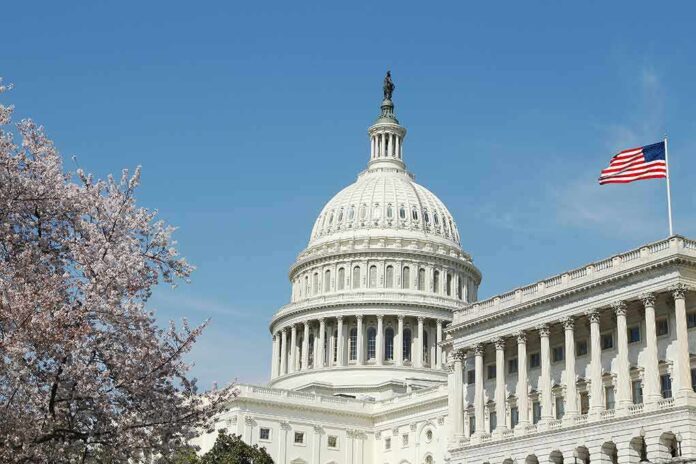
After 44 years in Congress, Sen. Dick Durbin announces his retirement, signaling potential shifts in the Democratic Party’s leadership landscape.
Key Insights
- Sen. Dick Durbin will not seek re-election in 2026, ending a 44-year congressional career.
- Durbin’s retirement opens a significant Senate leadership vacancy, prompting a competitive primary in Illinois.
- Durbin played key roles in major legislative efforts, including the DREAM Act and First Step Act.
- The Democratic Party faces internal pressures for younger leadership amid ongoing challenges against Republican strategies.
A Veteran’s Departure
Senator Dick Durbin, the second-ranking Democrat in the Senate, will not seek re-election in 2026. Durbin has been a dominant force in U.S. politics, first being elected to the House of Representatives in 1982 and the Senate in 1996. Over his four-decade-long career, Durbin held influential positions, such as the Democratic whip and chair of the Senate Judiciary Committee, significantly impacting legislative processes.
Senator Durbin announced his retirement on social media, stating, “It’s time to pass the torch,” acknowledging the need for a new generation of Democrats to take charge ([Source #4](https://www.theblaze.com/news/top-democratic-senator-announces-retirement-after-44-years-in-congress)). Known for championing the DREAM Act and playing a vital role in the confirmation hearings of Justice Ketanji Brown Jackson, his career has been marked by substantial legislative achievements.
Potential Candidates and Political Landscape
Durbin’s impending departure will create a leadership vacuum within the Democratic Party. Potential candidates for his Senate seat include Reps. Lauren Underwood, Raja Krishnamoorthi, Robin Kelly, Illinois Lt. Gov. Juliana Stratton, and state Sen. Robert Peters. Krishnamoorthi, notably, is reported to be preparing for a Senate run. This transition comes at a critical juncture as Democrats face challenges in maintaining Senate control, needing to defend current seats while gaining new ones.
ILGOP Statement on Dick Durbin Decision to Retire After 44 Years In Congress pic.twitter.com/jRuI0o8xNX
— IL Republican Party (@ILGOP) April 23, 2025
The Democratic Party grapples with its direction amidst calls for younger leaders. Figures like Sens. Brian Schatz and Amy Klobuchar are viewed as potential successors in leadership, underscoring an internal push for modernization and adaptability in an era of shifting global and domestic challenges. Republicans interpret Durbin’s decision as reflective of broader Democratic struggles, criticized by some as indicative of the party’s leftward shift.
Legacy and Future Outlook
Throughout his distinguished career, Durbin has been integral in significant legislative efforts, including criminal justice reform through the First Step Act and support for the Affordable Care Act. His departure underscores the ongoing evolution of the Democratic Party as it seeks to redefine itself amid a rapidly changing political landscape. Former President Barack Obama and Sen. Tammy Duckworth have also lauded Durbin’s impactful career and contributions to the nation.
As Democrats strategize for the future, Durbin’s retirement symbolizes a pivotal moment that could determine the party’s trajectory. With his departure, the focus shifts to potential successors and how the party will adapt to contemporary challenges while defending its established principles in a divided political environment.
In his announcement, Durbin gave a heartfelt farewell, stating, “I have given more than half of my life to House and Senate congressional service, and I’ve always tried to stand up to power on behalf of the people of Illinois and our country, I am proud of what I have achieved and hope my record will speak for itself.”
Sources:
- Longtime Democratic Sen. Dick Durbin won’t seek re-election in 2026
- Dick Durbin, No. 2 Senate Democrat, won’t seek re-election
- Sen. Dick Durbin, a top Senate Democrat, says he will not seek reelection : NPR
- Top Democratic senator announces retirement after 44 years in Congress | Blaze Media

























